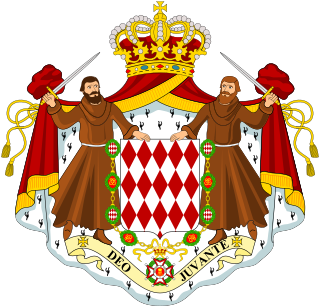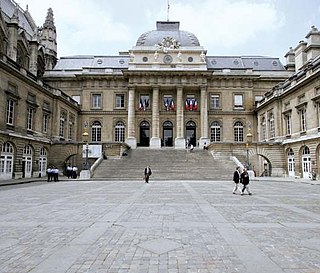Related Research Articles

The International Court of Justice, sometimes known as the World Court, is one of the six principal organs of the United Nations (UN). It settles disputes between states in accordance with international law and gives advisory opinions on international legal issues. The ICJ is the only international court that adjudicates general disputes between countries, with its rulings and opinions serving as primary sources of international law.

Monaco, officially the Principality of Monaco, is a sovereign city-state and microstate on the French Riviera a few kilometres west of the Italian region of Liguria, in Western Europe. It is bordered by France to the north, east and west, and the Mediterranean Sea to the south. The principality is home to 38,682 residents, of whom 9,486 are Monégasque nationals; it is widely recognised for being one of the most expensive and wealthiest places in the world. The official language is French, although Monégasque, Italian and English are spoken and understood by a sizeable group.

The General Court, informally known as the European General Court (EGC), is a constituent court of the Court of Justice of the European Union. It hears actions taken against the institutions of the European Union by individuals and member states, although certain matters are reserved for the European Court of Justice. Decisions of the General Court can be appealed to the Court of Justice, but only on a point of law. Prior to the coming into force of the Lisbon Treaty on 1 December 2009, it was known as the Court of First Instance.

The Principality of Monaco is a sovereign and independent state, linked closely to France by the Treaty of July 1918, which was formally noted in Article 436 of the Treaty of Versailles of 1919. The foreign policy of Monaco is one illustration of this accord: France has agreed to defend the independence and sovereignty of Monaco, while the Monegasque Government has agreed to exercise its sovereign rights in conformity with French interests, whilst at the same time maintaining complete independence. Since then, the relations between the sovereign states of France and Monaco have been further defined in the Treaty of 1945 and the Agreement of 1963.

The Court of Cassation is one of the four courts of last resort in France. It has jurisdiction over all civil and criminal matters triable in the judicial system, and is the supreme court of appeal in these cases. It has jurisdiction to review the law, and to certify questions of law, to determine miscarriages of justice. The Court is located in the Palace of Justice in Paris.

The sovereign prince or princess of Monaco is the monarch and head of state of the Principality of Monaco. All reigning princes and princesses have taken the name of the House of Grimaldi, although some have belonged to other families in the male line. When Prince Rainier III died in 2005, he was Europe's longest reigning monarch. The Grimaldi family, which has ruled Monaco for eight centuries, is Europe's longest-ruling royal family.

The judicial system of Turkey is defined by Articles 138 to 160 of the Constitution of Turkey.

The Court of Quebec is a court of first instance in the Province of Quebec, Canada.

The Supreme Court is the highest civil and criminal court in Burundi. It has nine members, including the Court President, who are nominated by the Judicial Service Commission and appointed by the President of the Republic after the approval of the Senate. The court's president is referred to as the Chief Justice.

The Monegasque Supreme Court is one of the highest courts of law in the city-state of Monaco for judicial appeals as well as ensuring the constitution of Monaco is upheld. It consists of five chief members and two assistant judges, appointed by the Prince of Monaco at the recommendation of the National Council of Monaco and other government bodies. The Supreme Court was established in 1962 following the new constitution to guarantee fundamental liberties.

The judiciary of Belgium is similar to the French judiciary. Belgium evolved from a unitary to a federal state, but its judicial system has not been adapted to a federal system.
The judiciary of Luxembourg comprises a number of courts.
The Judiciary of Kosovo is the collection of the central Kosovo institutions that exercises judicial authority in Kosovo. According to the 2008 Constitution of Kosovo, the judicial system is composed of the Supreme Court and subordinate courts, a Constitutional Court, and an independent prosecutorial institution. The courts are administered by the Kosovo Judicial Council.

In France, a cour d’appel of the ordre judiciaire (judiciary) is a juridiction de droit commun du second degré, a. It examines judgements, for example from the correctional tribunal or a tribunal de grande instance. When one of the parties is not satisfied with the verdict, it can appeal. While communications from jurisdictions of first instance are termed "judgements", or judgments, a court of appeal renders an arrêt (verdict), which may either uphold or annul the initial judgment. A verdict of the court of appeal may be further appealed en cassation. If the appeal is admissible at the cour de cassation, that court does not re-judge the facts of the matter a third time, but may investigate and verify whether the rules of law were properly applied by the lower courts.

Conscription in Monaco existed during a brief time between 1848 and 1870 when the Monégasque Militia was active. Since then, Monégasque citizens have been exempt both from conscription and direct taxation.
The Court of Revision is the highest judicial court in the Principality of Monaco. The Court rules on all matters concerning violation of the law, and on appeals against any last resort decision or final judgment of the court. The jurisdiction of the Court of Revision is regulated by Article 25 of the Law no 783 July 15, 1965 from 15 July 1965 on judicial organization. By statute, the Court of Revision consists of seven judges: a President, a Vice-President and five advisors. The Court of Revision is a member of the Francophone Association of High Courts of Cassation (AHJUCAF). As of 2021 the president of the Court of Revision is Cécile Chatel Petit, Honorary First Advocate General at the First Civil Chamber of the French Court of Cassation, former member of the Superior Council of the French Magistracy.
The Court of Appeal is a court of the second level of the judiciary in civil, criminal, commercial and administrative matters in the Principality of Monaco. The Court of Appeal judges on appeals of judgments delivered by the Court of First Instance. The Court of Appeal has a remarkable position in the Monegasque justice system due to its regulatory function, which is both judicial and legal. On the legal side, many of the Court’s judgments constitute law references establishing the Monegasque State of Law. On the judicial side, the Court contributes to guaranteeing that the institution of justice will comply both with law and professional ethics.
The High Council of Judges and Prosecutors is a collegial body invested with a preponderant role within the framework of the administration of justice of the Principality of Monaco. The High Council of Judges and Prosecutors was instituted by the law n° 1364 of November 16, 2009 relating to the statute of the magistracy. In November 2018, the new members of the High Judicial Council have been introduced in their new functions, under the chairmanship of Laurent Anselmi, Director of Judicial Services.

The Treaty of Stupinigi was signed on November 8th and 10th 1817, in Stupinigi between Honoré V, Prince of Monaco, and Victor Emmanuel I of Sardinia.
Monaco–Holy See relations are bilateral relations between the Principality of Monaco and the Holy See. The principal Monégasque official is Ambassador Claude Giordan, who officially started at his position in November 2015. The Holy See is represented by its Apostolic Nuncio, Archbishop Antonio Arcari, who assumed office on May 25, 2019. The Embassy of Monaco to the Holy See is located in Rome, on Largo Spinelli. The Apostolic Nunciature to Monaco is non-residing as the nuncio currently resides in Rome.
References
- 1 2 3 "The Justice of the Peace / Justice / Institutions / Government & Institutions / Portail du Gouvernement - Monaco". en.gouv.mc. Retrieved 2021-06-26.
- ↑ "The Justice System of the Principality of Monaco". Giaccardi & Brezzo Avocats. 2018-09-14. Retrieved 2021-06-26.
- ↑ "LégiMonaco - Textes non codifiés - Loi n. 741 du 25/03/1963 réglementant la cession et la saisie-arrêt des traitements, salaires, rémunérations et arrérages". www.legimonaco.mc. Retrieved 2021-06-26.
- ↑ USA, IBP (August 2013). Monaco Business Law Handbook Volume 1 Strategic Information and Basic Laws. Lulu.com. p. 37. ISBN 978-1-4387-7052-9.
